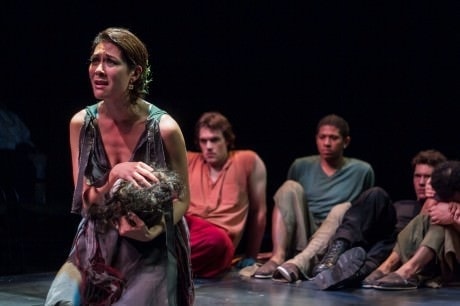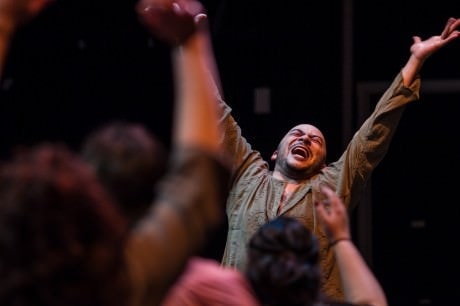Until the drumming began and the guitars wound their gypsy music across the stage and members of the chorus began to gyrate, I didn’t realize how much I was longing to see something new. How delighted I was to have found it, at the WSC Avant Bard’s The Bacchae, a play that, ironically, premiered in 405 BC.
WSC Avant Bard manages to infuse Euripides’ tragedy with energy, immediacy, tension, and excitement.

As the play opens, Dionysus, the god of wine who is worshipped with ecstatic revelry, is returning to the city of Thebes, ruled by his young cousin, Pentheus. Dionysus was believed to have died when his mother, Semele, perished, after convincing her lover, Zeus, to reveal himself to her in his true immortal form, a sight which proved too much for her. Zeus, in fact, hid Dionysus away. Now, returning to Thebes, Dionysus expects to be revered as a god. When the women of Thebes refuse to acknowledge his divinity, he casts them into madness. They go frenzied into the hills to perform his rites. Pentheus, the young king, scoffs at Dionysus and has him arrested. Although Dionysus escapes miraculously, Pentheus remains arrogant and proud, sure of his world and of what in it is divine and what human. When Pentheus learns his mother has gone into the hills with the Bacchae, he wants to wage war on the women. Dionysus convinces him instead to disguise himself and watch the revels. Pentheus agrees, is spotted by the women, and torn limb from limb by his own god-besotted mother.
The play in less skillful hands could easily be tedious, a compendium of violence, a meditation on deity irrelevant in our times. But under Steven Scott Mazzola’s direction, the audience hangs on every word. It doesn’t hurt that Nicholas Rudall’s translation is smooth, elegant, powerful, and poetic. With its echoes of Shakespeare and the King James Bible, the language sparks associations with Christianity and tragedies closer to us. Mazzola does a good job of recognizing the opposites that give the play its tension—human vs. divine, male vs. female—and the clashing and merging of those opposites that give the play its energy. The real source of conflict is not Dionysus’ arrival but the breakdown of absolutes that attends it. Dionysus is both human and divine, “God dressed in mortal blood.” Under his influence, the women of Thebes also cross nature’s boundaries. Possessed by the god, they leave their homes and babies, nurse wolf cubs instead, and become much stronger and more violent than men. Played by Jeremy Pace as a man/god who flirts suggestively with Pentheus, Dionysus embodies male and female elements. He gets Pentheus to violate that boundary, too. Pentheus dresses as a woman. Before leading him up the mountain, Dionysus plants a kiss on his lips.

In Artisphere’s space, no seat is more than five rows from the stage, and this intimacy serves the play well. Set Designer Jessica Moretti and Assistant Set Designer Brooke Robbins’ set is simple: a platform for the ten-member chorus, which resembles paving stones and is lit at times with constellation-like points of light and with intermittent glowing red lights on the side, and a rounded space below the platform that denotes the palace. The set’s bareness allows the chorus to be the focal point. Never leaving the stage, the chorus sings, dances, writhes, and worships. Fortunately, the chorus members are talented enough to carry the weight of the audience’s full attention for long periods of time. Choreographer Aysha Upchurch has created varied and compelling movement sequences, and Mariano Vales’ original score works for the most part very well. Elements that did not prove as compelling – a jarringly fake-looking Pentheus head, for example, and an interesting but distractingly mobile god-head mask – are easy to overlook in a production carried out with such skill.
Not the least of this skill is in the acting. Frank Britton, as the Herdsman, and Jim Jorgensen, as the slave, are outstanding. Theodore M. Snead does a fine job as Cadmus. Pace, making his professional debut, pulls off a mysterious, sexy, and sultry Dionysus.
WSC Avant Bard’s The Bacchae is exciting and filled with powerful performances from an outstanding cast. Don’t miss it!
Running Time: 90 minutes with no intermission.
The Bacchae plays through July 1, 2012 at WSC Avant Bard at Artisphere – 1101 Wilson Boulevard, in Arlington, VA. For tickets, call the box office (888) 841-2787, or purchase them online.
More information here.





